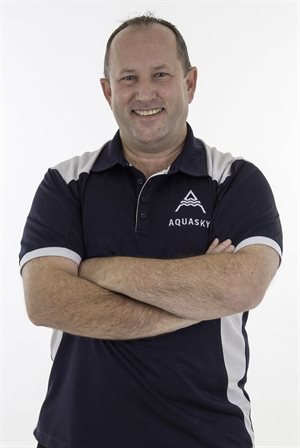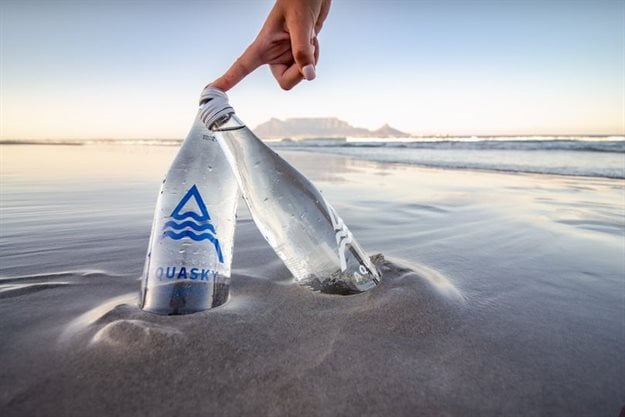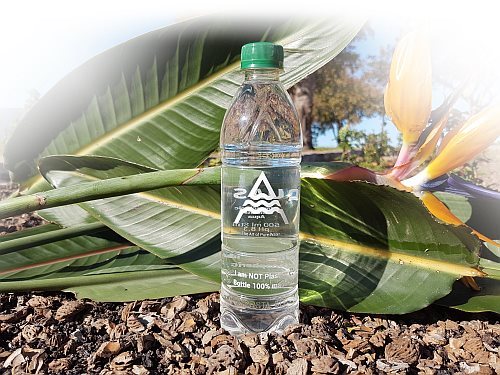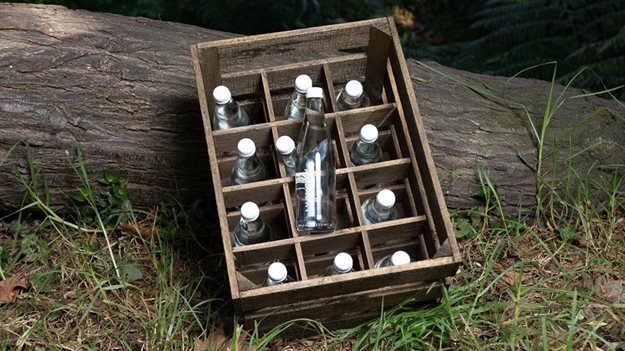Necessity breeds innovation, and this was certainly the case during Cape Town's 2017/18 drought when dam levels reached alarming levels. The city was brimming with ideas and possible solutions from all spheres on how to avoid Day Zero - the day household taps would run dry.
This is where Aquasky's startup story begins - a water brand that extracts water from the clear blue sky and then bottles it. But the innovation doesn't stop there.
“Water is evolving,” says Aquasky founder and MD Brendan Williamson, “It’s not just about simply having bottled water on the shelf. Everyone is looking to add value and make the experience of consuming water exciting. Whether its unique flavours or pairing certain types of regional flavoured waters with different dishes. Just as there’s wine sommeliers, we now have dedicated water sommeliers – sommeliers who study the flavours of water based on the region it is from and how to pair with food. The bar has been lifted. To ensure that our product is top notch, we must continuously improve."

Brendan Williamson, founder and MD of Aquasky
Williamson shared with us a bit about how the Aquasky's technology works, how the company is managing its carbon footprint, and what the future holds for Aquasky.
Share with us Aquasky's startup story.
Brendan Williamson: We were in the grip of an extensive drought in 2017 and Day Zero was looming for the City of Cape Town. We all had to adjust quite quickly to the new norm of saving water. During this time, I went on a short break, and I managed to look at various options on how one could assist and create a sustainable solution in these drought situations.
I stumbled across this concept of making water from air and I was immediately intrigued by the concept and to think that none of the water used would affect the ailing water shortage. The main aim in the beginning was to supply various units in bulk, but I needed to think long term and that is when I thought of the concept of putting the water in bottles and offering the product to the end consumer.
Extracting water from the sky? How does the technology work exactly?
Williamson: The process is amazingly simple but highly technical and complex at the same time. The water units extract the warm air from the atmosphere by simply drawing the air into the units with two large fans. Once this air enters the units it passes over two cooled condensers that are cooled by refrigeration compressors. Once this hot air comes into contact with the condensers it cools, condensers and creates water droplets that are collected. The water droplets are then passed through various filters and well as ultraviolet light. Once this process is complete, the water is ready to drink on demand from the unit.
How widespread is the technology's use currently?
Williamson: The technology has been around for many years but, unfortunately, not many companies or organisations are using it. Perhaps this is due to not understanding or being educated on how this technology could assist them.
On what scale is it currently available?
Williamson: There are many variations available. One really needs to investigate and do your homework correctly to acquire the best units available. The units are not cheap, and one needs to ensure the technology and build quality is correct from day one. You can obtain units from as little as 30L per day, up to the sizes of 5,000L per day.
Water sommeliers? That's new - tell us more.
Williamson: When I first started the business, water was water, and one could only tell the difference by the brand name. But once I started to look at the more technical aspects of the various products, one can clearly see and taste that all waters are different and unique. One has always heard of sommeliers in the wine industry, but now we are seeing this expanding into the water market. It now creates a fantastic platform to present our water and craft to the market.
How are you currently managing Aquasky's carbon footprint?
Williamson: This is the first question I usually get asked. (Fantastic you are making water from the air, but are you aware that your units use electricity which is expensive and draining our resources.)
Yes, I am aware, as that cost also determines my main cost element of my product. As I mentioned previously, when one looks at the various units, you need to do your homework and that is exactly what I did. The units we use measure each element of the atmosphere to create a single drop of water. If the elements are not correct, the unit will detect this and immediately go into stand by mode. This ensures our precious resource is not wasted and the cost per litre is kept to a minimum. We are also aware of the rising costs of electricity, and we are slowly moving over to solar energy to compensate for this.
On our product offering, at least 80% of our business is offered in glass bottles. We also repurpose these bottles as we collect all the empties. We then wash, sanitise and refill and redeliver. This takes a single-use product and turns it into a turnaround of at least 50 times. We also have compostable bottles made from sugarcane and hope to replace all our PET (polyethylene terephthalate, a clear, strong, and lightweight plastic that is widely used for packaging foods and beverages, especially convenience-sized soft drinks, juices and water) bottles by the end of 2021.
What does the future hold for Aquasky?
Williamson: We have grown significantly since I opened at the end of 2017. We have changed and adjusted with our clients during this time as well. Covid-19 has had a huge impact on our business as we predominantly supply the hotel and restaurant sectors, so we needed to regroup and move forward. During the time of the lockdown, we did various product developments, looked for new premises and planned extensively for the future based on new markets. We were basically forced to think out the box and be innovative. So, to answer the question, I am positive that we shall grow and move forward with what we have planned, and we will definitely keep all informed of our progress.
What advice would you give to other aspiring entrepreneurs?
Williamson: When you have an idea, explore it. Investigate all aspects of what you have in mind. Speak to the correct people in that industry. Plan accordingly and correctly as we are often led by our heart and enthusiasm, and we forget the business side of things.
Have those extra funds stashed away for the rainy days, i.e., Covid-19, as your cash flow and planning are key to what you envisage and hope to achieve.
South Africa has so much potential and aspiring people. Anything is possible if you work hard and surround yourself with like-minded individuals.

























































